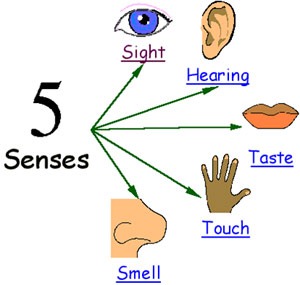VAKOG
We experience the world through our senses - through five of them to be exact (claims of a sixth have yet to be scientifically verified). It is hence a natural process for learning to occur through these five senses - Visual, Auditory, Kinesthetic, Olfactory and Gustatory (VAKOG). A high tech-sounding acronym, VAKOG simply means that we learn by seeing, hearing, touching, smelling and tasting the environment around us. It implies that there are more ways to learn something than just reading about it in a book (Visual).
Image courtesy of coach2change.files.wordpress.com
NLP
NLP or Neuro-Linguistic Programming was developed by Richard Bandler and John Grinder as a psychological tool to "upgrade" our brain's "mental software". Bandler and Grinder in their book, The Structure of Magic, claim that NLP enables the abilities of high achievers to be acquired by anyone simply by "modelling" them [1]. NLP is also claimed to be able to cure fears and phobias.
NLP does bear some relation to VAKOG in particular as the "Neuro" in NLP refers our the nervous system which is stimulated through our five senses, "Linguistic", our silent language of gestures, beliefs and habits that reveal how we think and "Programming", which is a borrowed term from computing to show that the brain's "software" can be "upgraded [2].
A personal favourite of mine is Andreas and Faulkner's book, NLP: The New Technology of Achievement as an excellent starter for those of us interested in putting NLP theories to practice.
The Learning Styles Debate in a Nutshell
The Learning Styles debate centers around the claim that different students have different modes of learning, and their learning could be improved by matching one's teaching with that preferred learning mode [3].
There is consensus among proponents of the debate that teaching and learning should be tailored to meet not only learners' VAKOG profiles, but should also account for other differences like interests, abilities and background knowledge.
They agree that although some learners learn better by doing, some by observing, some by hearing, but that among those who learn better by observing, two or three out of the group might have advanced knowledge in calculus, while the rest only have elementary knowledge.
Hence by taking into account all of these factors and having an indication as to learners preferred styles, interests, abilities etc. perhaps through a survey before a course, an educator could tailor the delivery of content through certain media to meet the needs of the learners. Here, it is certain that the use of IT could meet this need.
References
[1] Bandler, Richard; John (1975). The Structure of Magic I: A Book about Language and Therapy. Science and Behavior Books Inc.
[2] Andreas, S., & Faulkner, C. (1994), NLP: The New Technology of Achievement, New York, Harper.
[3] Riener, C. & Willingham, D., (2010). The Myth of Learning Styles. Change Magazine. Sep-Oct Issue


